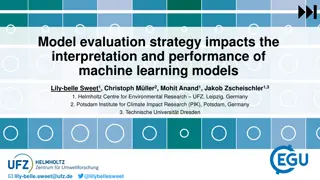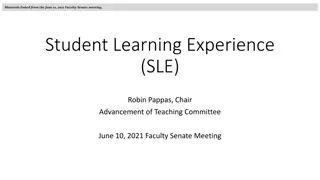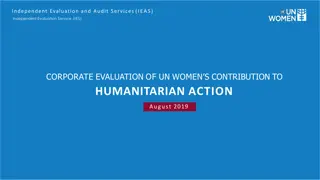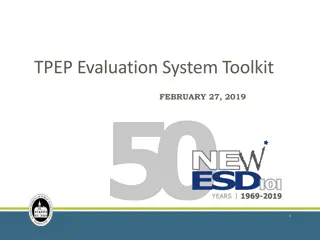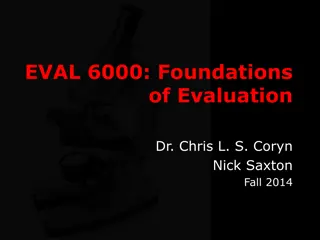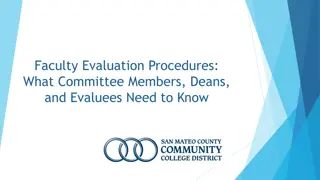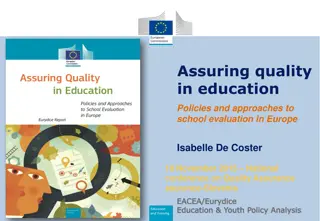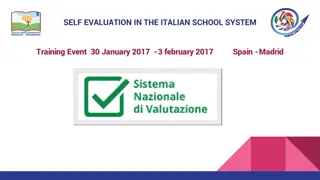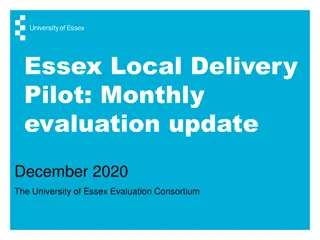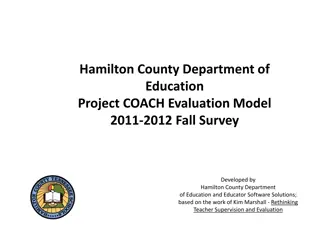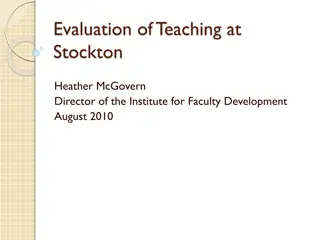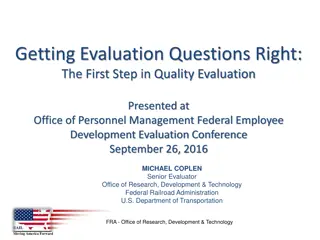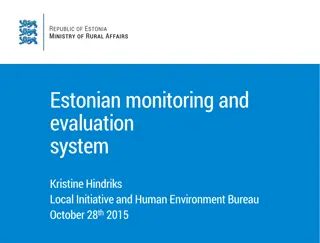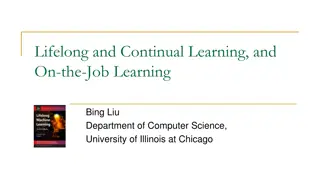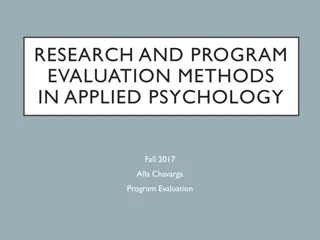Actions Emanating from the Evaluation of the Governance Reform
The evaluation of the governance reform within the WMO aimed to assess its alignment with strategic objectives, effectiveness in responding to societal needs, coordination efficiency, decision-making process, agility, and more. Evaluation criteria included relevance, design validity, effectiveness,
1 views • 13 slides
Model evaluation strategy impacts the interpretation and performance of machine learning models
The evaluation strategy used for machine learning models significantly impacts their interpretation and performance. This study explores different evaluation methods and their implications for understanding climate-crop dynamics using explainable machine learning approaches. The strategy involves tr
6 views • 16 slides
Comprehensive School Quality Assurance and Evaluation Process
A detailed insight into the Quality Assurance Department's role in school evaluation and improvement processes, including Whole School Evaluation (WSE), Follow-through initiatives, Teaching and Learning assessments, Resumption and Examination Monitoring. The process involves both internal self-evalu
0 views • 20 slides
Methods of Training Evaluation: Overview and Importance
Training and development are fast-growing fields globally, including in India. Evaluation plays a crucial role in understanding the effectiveness and efficiency of training programs for human resource development. This presentation covers the concept of training, evaluation strategies, methods/model
0 views • 61 slides
Universal Evaluation Framework: Simplifying Evaluation Processes
This session introduces the Universal Evaluation Framework (UEF) developed for evaluating QAA Scotland Enhancement Themes. Participants learn key evaluation questions, evidence capture, and the Theory of Change to enhance evaluation confidence. The QAA Scotland Evaluation Odyssey details historical
2 views • 14 slides
Implementing Blind Evaluation Pilot in HORIZON EUROPE: Key Facts and Process
HORIZON EUROPE is conducting a pilot on Blind Evaluation in the 2023-2024 work program to address biases in the research and innovation evaluation process. The pilot aims to assess the feasibility of blind evaluations in ensuring fairness and mitigating potential biases towards well-known organizati
9 views • 9 slides
Faculty Senate Meeting Highlights on Student Learning Experience (SLE) Pilot and Implementation
June 10, 2021 Faculty Senate meeting discussed the Student Learning Experience (SLE) Pilot Program with focus on implementing Quality Teaching Student Learning Experience (QT SLE) to replace eSET for student feedback. The motion includes key recommendations, pilot resources, and evaluation strategie
0 views • 9 slides
Strengthening National Evaluation Capacity in the Era of Sustainable Development Goals
The presentation by Vijayalakshmi Vadivelu at the National Evaluation Capacities Conference 2017 in Istanbul focused on the importance of strengthening national evaluation capacity in alignment with the Sustainable Development Goals (SDGs). The content covers the holistic approach to national evalua
3 views • 18 slides
Exploring Developmental Evaluation for Better Decision-Making
Delve into the realm of developmental evaluation, focusing on its purpose, principles, and application in practice. Understand how developmental evaluation emphasizes real-time data collection for informed decision-making in complex systems. Learn about key principles such as developmental purpose,
0 views • 25 slides
Evaluation Practices in Macedonia: What Works, What Doesn't
The comparison between the effectiveness of evaluation practices and the presence of formal institutions in Macedonia raises questions about the impact of institutional design on outcomes. While some countries with robust evaluation institutions fall short in practice, others lacking such structures
1 views • 7 slides
Enhancing Evaluation Capabilities in Mongolia for Agenda 2030
The Mongolian Evaluation Network in collaboration with UNDP is working to integrate the 2030 Agenda into national strategies and plans, establish institutional coordination mechanisms, align budgets, and enhance data monitoring systems. Key stakeholders including government agencies, NGOs, and inter
0 views • 9 slides
Understanding Demi-Regularity in Realist Evaluation
Realist Evaluation is a theory-driven approach focusing on understanding the context and mechanisms of action behind policies and interventions. This webinar explores the concept of demi-regularity in realist evaluation, its origins, and its application in analyzing complex evidence. Key aspects cov
0 views • 16 slides
Understanding Evaluation in Education
Evaluation in education is a comprehensive term that encompasses measurement, testing, and qualitative examination of student behavior. It involves both quantitative and qualitative descriptions, along with value judgments. Differentiating from mere measurement, evaluation provides a deeper analysis
0 views • 28 slides
Corporate Evaluation of UN Women's Contribution to Humanitarian Action
The Independent Evaluation and Audit Services conducted an evaluation of UN Women's work in humanitarian action from 2014-2018, assessing its relevance, effectiveness, and sustainability. The evaluation emphasized the need for stronger links between UN Women's global normative work and humanitarian
0 views • 9 slides
Sustainable Evaluation Systems Workshop Summary
Workshop on Sustainable Evaluation Systems by Stephen Porter at the NEC Conference focused on defining evaluation systems, addressing their failures, and emphasizing the importance of quality, use, and networks in achieving sustainability. Participants engaged in activities such as bingo card introd
0 views • 38 slides
Strategic Management: Strategy Review and Evaluation
This chapter delves into the critical process of strategy review, evaluation, and control in strategic management. It covers the nature of strategy evaluation, effective evaluation systems, contingency planning, auditing, using computers for evaluation, and guidelines for effective strategic managem
1 views • 42 slides
Innovative Learning Management System - LAMS at Belgrade Metropolitan University
Belgrade Metropolitan University (BMU) utilizes the Learning Activity Management System (LAMS) to enhance the learning process by integrating learning objects with various activities. This system allows for complex learning processes, mixing learning objects with LAMS activities effectively. The pro
4 views • 16 slides
Understanding Evaluation and Ideology in Translation
Evaluation plays a crucial role in the study of translation, influencing both meaning and value in communication. This evaluation is reflected through language elements like accentuation, deletion, and substitution. Appraisal, stance, and evaluation are key terms in linguistic analysis that focus on
2 views • 22 slides
Impact and Evaluation Toolkit for Churches and Christian Charities
This toolkit aims to equip churches and Christian charities engaged in small-scale social action projects to think about impact, measure impact, choose data tools, reflect on evaluation data, and use it effectively. It covers principles of evaluation, setting objectives, selecting indicators, storyt
0 views • 34 slides
Evaluation Metrics for IEEE 802.11-14/0107 HEW Proposal
Evaluation metrics play a crucial role in assessing WLAN system performance and achieving the objectives of High Efficiency WLAN (HEW). This proposal by Yonggang Fang et al. from ZTE outlines the key evaluation metrics recommended for evaluating HEW performance, including area throughput, average th
0 views • 12 slides
Overview of Monitoring and Evaluation in the GEF
The Evaluation in the GEF and Training Module focuses on promoting accountability and learning within the Global Environment Facility (GEF) through monitoring and evaluation activities. The GEF Independent Evaluation Office plays a crucial role in assessing results, effectiveness, and performance of
0 views • 25 slides
Chile Country Portfolio Evaluation 2010-2014 Summary
Evaluation process of Chile's country portfolio from 2010-2014 included pre-evaluation, during evaluation, and results/conclusions phases. Challenges like defining scope and participant concerns were addressed. Preliminary conclusions were presented to stakeholders, leading to a trustful and represe
1 views • 6 slides
Potential Amendments for Reforming REACH Evaluation Process
Discussion at the Ad-hoc Meeting of Competent Authorities for REACH and CLP focused on potential options for amending the REACH Regulation to reform the evaluation process. Topics included registration-related measures, substance evaluation, testing proposals, compliance checks, and expectations dur
0 views • 30 slides
Effective Educator Evaluation System Toolkit for Districts
The TPEP Evaluation System Toolkit provides a comprehensive guide for leading educator evaluation systems in schools and districts. It covers key elements such as district leadership, professional learning, and self-assessment opportunities. The toolkit aims to enhance educator effectiveness and pro
0 views • 20 slides
Developing an Evaluation Work Plan for Effective Program Assessment
This presentation by Amy D. Andrade from San Jose State University focuses on developing an Evaluation Work Plan to identify responsibilities and timelines. It covers topics such as Evaluation Coaching Support, Webinar Outlines, Logic Model, Inputs-Outputs-Outcomes, Two Approaches to Evaluation, Pro
0 views • 29 slides
Foundations of Evaluation - Conference Experience and Approaches
The Foundations of Evaluation course covers diverse topics such as improvement- and accountability-oriented evaluation approaches, social agenda evaluation, and eclectic approaches. The course material includes insights on decision- and accountability-oriented studies, methods for program improvemen
0 views • 29 slides
Evaluation Synthesis in Changing Contexts: Enhancing Knowledge for Development Effectiveness
Evaluation synthesis is crucial for promoting learning, reflection, and decision-making in development work. This process involves bringing together diverse knowledge sources to generate strategic insights and facilitate wider use of evaluation findings. The Independent Office of Evaluation of IFAD
0 views • 20 slides
Evaluation of FME Zero Emission Neighbourhoods in Smart Cities
The mid-term evaluation process of FME Zero Emission Neighbourhoods in Smart Cities involves self-evaluation, partner evaluation, and panel evaluation. The procedure includes scientific review, evaluation by scholars, and innovation assessment. Key documents like self-reports, progress reports, and
1 views • 20 slides
Overview of Regular Evaluation 2017 Findings in Estonia
In the Regular Evaluation 2017, efforts were made to maximize the benefits of evaluation outcomes for various stakeholders in Estonia such as the state, society, and institutions. The evaluation focused on a range of actions including preparing legislation, finding experts, creating self-report form
0 views • 6 slides
Faculty Evaluation Procedures: Committee Structures and Purpose Overview
This slide deck provides information on faculty evaluation procedures, emphasizing the purpose of the evaluation process in supporting faculty development, ensuring student access to quality education, and upholding academic freedom. It also details the committee structures for comprehensive tenured
0 views • 19 slides
Comprehensive Guide to Training Evaluation Methods
This detailed guide covers the aim of evaluation, evaluation methods, techniques of evaluation, types of evaluation (formative, process, outcome, impact), and the significance of formative and process evaluation in assessing training effectiveness. Learn about the key principles and practices involv
0 views • 45 slides
Ensuring Quality in Education: School Evaluation in Europe
Explore the policies and approaches to school evaluation in Europe with a focus on external and internal evaluation methods, quality assurance approaches, and recommendations from the European Parliament and Council. Discover insights on the purpose and evolution of school evaluation, emphasizing th
0 views • 23 slides
Evaluation System in Italian Schools: A Comprehensive Overview
Italy's school evaluation system has recently been established to improve educational quality and provide necessary support. The process involves self-evaluation, improvement actions, external evaluation, and reporting of results. Data from Ministry of Education and INVALSI are utilized, leading to
0 views • 23 slides
December 2020 Essex Local Delivery Pilot Monthly Evaluation Update
The December 2020 update of the Essex Local Delivery Pilot's monthly evaluation includes actions from the previous month, process evaluation details, population information, test and learn strategies, learning and development insights, recommendations, and further information. Key evaluation activit
0 views • 30 slides
Evaluation Model for Teacher Supervision and Feedback in Education
Evaluation model conducted by Hamilton County Department of Education in collaboration with Educator Software Solutions, based on Kim Marshall's work on rethinking teacher supervision and evaluation. The evaluation covers aspects like grade levels served, positions held by educators, goal setting co
0 views • 18 slides
Evaluation of Teaching at Stockton: Methods and Recommendations
This document provides insights into the evaluation of teaching practices at Stockton University, focusing on multiple assessment methods such as self-evaluation, student evaluations, peer observations, and building teaching portfolios. It outlines steps for faculty to follow, including selecting ob
0 views • 77 slides
Understanding Evaluation Questions for Quality Assessment in Federal Programs
Presentation by Michael Coplen at the Office of Personnel Management Federal Employee Development Evaluation Conference focused on the importance of developing quality evaluation questions, common flaws, and driving actionable evaluation by using evidence and rigorous criteria. The session highlight
0 views • 35 slides
Estonian Monitoring and Evaluation System Overview
Estonian Monitoring and Evaluation System involves elements like Evaluation Plan, Ex-ante and Ex-post evaluation, compulsory indicators, and regulations for data collection. It outlines the responsibilities of Managing Authorities and LAGs in planning and conducting evaluation activities. The system
0 views • 20 slides
Lifelong and Continual Learning in Machine Learning
Classic machine learning has limitations such as isolated single-task learning and closed-world assumptions. Lifelong machine learning aims to overcome these limitations by enabling models to continuously learn and adapt to new data. This is crucial for dynamic environments like chatbots and self-dr
0 views • 32 slides
Understanding Program Evaluation Methods in Applied Psychology
Program evaluation in applied psychology involves investigating the effectiveness and impact of social programs or interventions. Its goal is to assess whether the costs of a program are justified, not to produce generalizable knowledge. Evaluation seeks to reduce uncertainty for decision-makers and
0 views • 30 slides

